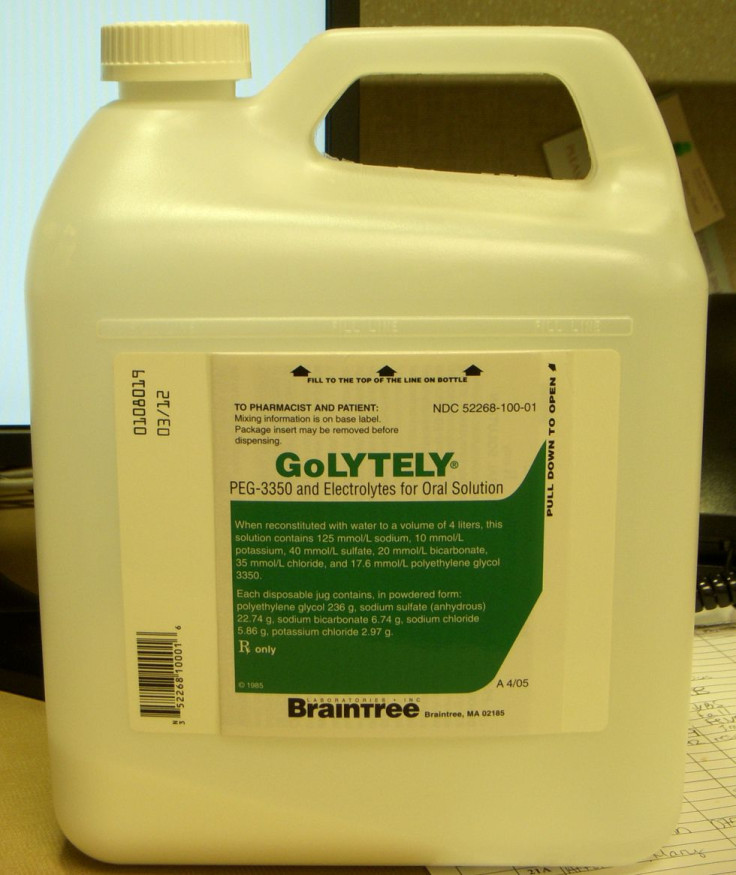Preparing For A Colonoscopy Might Someday Involve Chomping Into A Tasty Meal

“Colonoscopy” might just be the most uncomfortable yet necessary 11-letter word in the English language.
According to the American Cancer Society, an estimated 132,700 new cases of colorectal cancer are expected this year, and its death toll will reach nearly 50,000. As things stand, it is considered the second leading cause of cancer-related deaths among men and women. And while it isn’t perfect, the colonoscopy remains an effective preventative tool to detect these cancers early on, before treatment becomes cumbersome or even ineffective. That’s why it’s recommended once every ten years for people starting at the age of fifty. But only 62 percent of recommended Americans have received one recently, rates even more abyssal when compared to other cancer screening methods like the mammography or Pap smear, as per the Centers for Disease Control and Prevention.
Much of this reluctance can be traced to the intensive preparation needed for a colonoscopy, with patients needing to both fast and ingest heavy-duty laxatives for one to two days before the exam in order to clean out their colon for examination – to say nothing of the awkward reality of having a doctor insert a camera attached to a thin tube through your rectum and colon. “You mix two packets of [MoviPrep] powder together in a one-liter plastic jug, then you fill it with lukewarm water. Then you have to drink the whole jug,” wrote humorist Dave Berry of the Miami Herald on preparing for his first colonoscopy in 2008, “This takes about an hour, because MoviPrep tastes – and here I am being kind – like a mixture of goat spit and urinal cleanser, with just a hint of lemon.”
Luckily for Berry and others like him, that taste might soon be something that they’ll never have to deal with again, if the results from an early pilot study presented at the Digestive Disease Week conference are as encouraging as they appear to be. Its authors found that with a few adjustments to existing recipes, they could create meals coated with the same medications needed to cleanse out the colon but with none of the grueling, thankless effort needed to gulp it down.
Working together with food scientists, the authors developed a "novel edible bowel regimen," creating foods and drinks infused with the proper laxatives and electrolytes needed to maintain a clean colon without inadvertent dehydration. It was a process that was surprisingly difficult for them. "Adding polyethylene glycol to many substances just doesn't work," study author Corey Siegel of the Dartmouth-Hancock Medical Center in New Hampshire told New Scientist, "It either makes it fall apart or taste funny, or it doesn't hold a form." These meals were additionally made to be low-residue, thus reducing the need for patients to frequently and repeatedly empty their bowels.
The authors planned to enroll as many as thirty colonoscopy patients in order to evaluate how effective their preparation would be compared to the standard preparation, but by the tenth patient, they were already convinced of their concoction’s runaway success. Rating their colon's cleanliness, all ten patients passed with flying colors, scoring good or excellent. More importantly, there were no complaints from any of the patients with their meals, with all ten having finished at least 95 percent of it, and they all reported a complete willingness to go through it again. As the authors explain, these ratings are in sharp contrast to the current preparation, with 5 to 15 percent of people not even able to finish their colon cocktails, which makes for a much less effective colorectal examination.
As the New Scientist reports, the authors are interested in making more palatable and efficient meals like cereal and pasta for the next phase of trials already underway. Should their results hold up in larger randomized experiments, these colon cuisines might be available by 2017. Which means that, someday soon, preparing for a colonoscopy could be the tastiest way to help fight cancer.
Source: Levy L, Greene J, Toor A, et al. Cleansing for Colonoscopy: A Pilot Study of an Edible Colon Preparation. Gastrointestinal Endoscopy. 2015



























